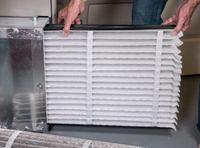5 Ways to Make Your Home More Comfortable for People With Asthma

Your home should be somewhere you feel peace and comfort at all times. Unfortunately, there are numerous parts of a household, such as the heating and cooling system, carpet, and furniture, where allergens can regularly be found hiding. If you or anyone else in your family has asthma, this can aggravate the condition and cause serious health problems. Thus, it’s important to get rid of as many potential asthma triggers as possible. Here are a few steps you can take to make your living space more asthma-friendly.
5 Tips for Reducing Asthma Triggers in Your Home
1. Prevent Mold Growth
Mold frequently activates asthma symptoms. Since mold thrives in damp places, you must take preventive measures to limit the amount of moisture allowed to form inside your home. You can do this by fixing water leaks as soon as they’re detected, making sure there is adequate ventilation in the bathroom and kitchen, and using a dehumidifier to keep humidity levels down.
2. Ward Off Pest Infestations
There is potential for unwelcome critters to find their way into even the cleanest homes. Cockroach infestations, in particular, are a major asthma trigger. You can make your living space less inviting to these pests by storing food in airtight containers, keeping surfaces free of crumbs, not letting dirty dishes sit in the sink, using a lidded garbage can, and putting away pet food dishes each night.
3. Minimize Indoor Pollutants
 The air inside a home can be just as polluted as the air outside. Improving your indoor air quality and minimizing pollutants can go a long way toward decreasing asthma flare-ups. Don’t smoke inside, have your chimney inspected and cleaned annually, change the filters in your heating and cooling system once a month, and consider running an air purifier.
The air inside a home can be just as polluted as the air outside. Improving your indoor air quality and minimizing pollutants can go a long way toward decreasing asthma flare-ups. Don’t smoke inside, have your chimney inspected and cleaned annually, change the filters in your heating and cooling system once a month, and consider running an air purifier.
4. Avoid Using Household Chemicals
A number of common household products contain chemicals that can irritate the airways and bring on an asthma attack. This includes glue, paint, cosmetics, cleaners, air fresheners, and pesticides. If you notice your asthma worsening when these products are in use, it’s best to avoid them and opt for homemade remedies or all-natural solutions.
5. Control Dust
A dusty home is unappealing, as well as unsafe for people with asthma. You can reduce the amount of dust present in your home by wiping down surfaces regularly, vacuuming carpet and upholstered furniture weekly with a filtered vacuum, wash linens in high heat, and enclose mattresses and pillows in dust-proof fabric covers.
The fewer asthma triggers your living environment harbors, the easier it will be to breathe and relax in the comfort of your own home. If you need help maintaining your heating and cooling system, contact the professionals at Donovan & Jorgenson. For more than three decades, they have provided residents throughout the Greater Milwaukee, WI, area with a range of reliable HVAC services. They will make sure your equipment is running at peak efficiency and ensure it’s clean and free of harmful allergens that can lead to asthma attacks. Visit them online to learn more about their heating and cooling expertise.
About the Business
Have a question? Ask the experts!
Send your question

